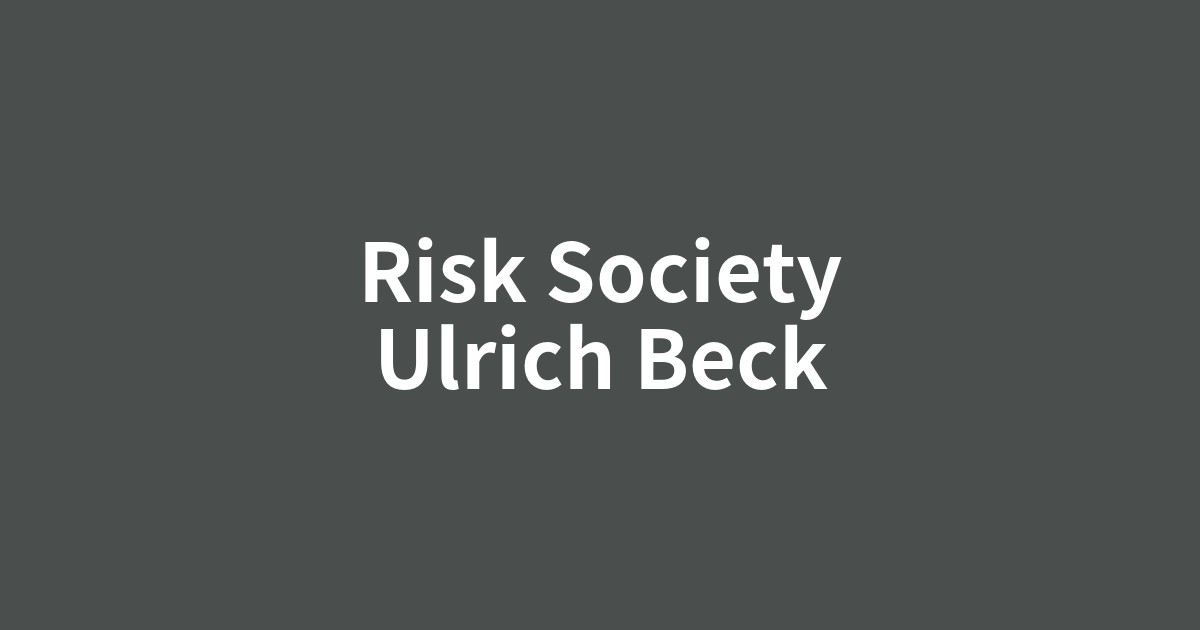このページは、歴史や文化の物語を楽しみながら、その文脈の中で重要な英単語を自然に学ぶための学習コンテンツです。各セクションの下にあるボタンで、いつでも日本語と英語を切り替えることができます。背景知識を日本語で学んだ後、英語の本文を読むことで、より深い理解と語彙力の向上を目指します。

科学技術が生み出す、目に見えず、国境を越える新たなリスク。ドイツの社会学者ウルリッヒ・ベックが提唱した、現代社会の姿。
この記事で抑えるべきポイント
- ✓「リスク社会」とは、科学技術の発展が生み出す、国境を越え、目に見えない新たなリスクの「分配」が社会の中心課題となる現代社会の姿を指す概念であること。
- ✓ドイツの社会学者ウルリッヒ・ベックが提唱し、産業化の成功がもたらした「富の分配」の問題から、「リスクの分配」の問題へ社会の関心が移行したと論じたこと。
- ✓1986年のチェルノブイリ原発事故は、そのリスクが不可視で、地理的な境界を無効にし、専門家でさえ制御が困難であることを示し、「リスク社会」を象徴する出来事とされていること。
- ✓現代のリスクは、気候変動やパンデミック、AIの倫理問題など多岐にわたり、私たち自身がそのリスクとどう向き合うかが問われる時代であること。
リスク社会とは ― チェルノブイリが明らかにした現代のリスク
もし、あなたが毎日吸っている空気に、目に見えない危険が潜んでいるとしたら?にわかには信じがたいかもしれませんが、現代社会は、かつてとは全く異なる種類の脅威と隣り合わせにあります。その転換点を象徴するのが、1986年に起きたチェルノブイリ原子力発電所の事故でした。この未曾有の災害は、単なる一地域の悲劇に留まらず、私たちの社会のあり方そのものを問い直すきっかけとなったのです。本記事では、ドイツの社会学者ウルリッヒ・ベックが提唱した「リスク社会」という概念を手がかりに、現代に潜むリスクの本質に迫ります。
What is Risk Society? — The Modern Risks Revealed by Chernobyl
What if the air you breathe every day contained an invisible danger? It might be hard to believe, but modern society coexists with threats of a completely different nature than those of the past. A symbolic turning point was the Chernobyl nuclear power plant accident in 1986. This unprecedented disaster was not just a regional tragedy; it prompted a re-examination of the very nature of our society. This article delves into the essence of the risks lurking in our modern world, using the concept of the "Risk Society," as proposed by German sociologist Ulrich Beck, as our guide.
「リスク社会」の誕生 ― ウルリッヒ・ベックの警告
「リスク社会(Risk Society)」とは、ドイツの社会学者ウルリッヒ・ベックによって提唱された、現代社会を読み解くための重要な概念です。彼によれば、かつての産業社会(階級社会)では、「富をいかに公平に分配するか」が社会の中心的な課題でした。しかし、産業化が高度に進み、社会が豊かになるにつれて、新たな問題が浮上します。それは、科学技術の発展が生み出す「意図せざる悪い結果(consequence)」、すなわちリスクを誰が引き受け、どう管理するのかという問題です。ベックは、社会の関心事が「富の分配」から「リスクの分配」へと移行した点に、現代社会の本質を見出しました。
The Birth of the "Risk Society" — Ulrich Beck's Warning
"Risk Society" is a key concept for understanding modern society, proposed by the German sociologist Ulrich Beck. According to him, the central issue in past industrial societies (class societies) was how to distribute wealth fairly. However, as industrialization advanced and societies became more affluent, a new problem emerged: who would bear and how would we manage the unintended negative "consequences"—that is, the risks—created by scientific and technological development. Beck identified the essence of modern society in this shift of focus from the "distribution of wealth" to the "distribution of risk."
チェルノブイリが明らかにした、現代的リスクの姿
1986年のチェルノブイリ原発事故は、ベックが指摘する「リスク社会」を世界中の人々が目の当たりにした決定的瞬間でした。この事故が放出した放射性物質は、まさに現代的リスクの特性を凝縮しています。第一に、放射能は五感では捉えられず、完全に「目に見えない(invisible)」存在です。人々は専門家の測定値に頼るしかなく、見えない脅威への不安が社会に広がりました。第二に、そのリスクは国境を軽々と越えていきます。風に乗った放射性プルームは、ウクライナからベラルーシ、そしてヨーロッパ全土へと拡散し、地理的な境界が無意味であることを示しました。そして最も恐ろしいのは、その影響が「元に戻せない(irreversible)」ことでした。汚染された大地や森林は、人間の時間感覚では決して元には戻らないのです。この事故は、人間が生み出したリスクが、もはや人間のコントロールを超えうることを痛感させました。
The Nature of Modern Risk as Revealed by Chernobyl
The Chernobyl nuclear accident in 1986 was a defining moment when people worldwide witnessed the "Risk Society" that Beck had described. The radioactive material released in this accident encapsulates the characteristics of modern risk. Firstly, radiation cannot be perceived by the five senses; it is completely "invisible." People had no choice but to rely on experts' measurements, and anxiety about the unseen threat spread throughout society. Secondly, the risk easily transcends borders. The radioactive plume, carried by the wind, spread from Ukraine to Belarus and across Europe, demonstrating that geographical boundaries were meaningless. And most frighteningly, its effects are "irreversible." The contaminated land and forests will never return to their original state within a human timescale. This accident made us acutely aware that the risks created by humans can exceed human control.
私たちは皆「リスク」の当事者 ― 福島、そして未来へ
チェルノブイリの教訓は、決して過去のものではありません。2011年の福島第一原発事故は、ここ日本で再び私たちにリスク社会の現実を突きつけました。そして、私たちの周りを見渡せば、リスクは多様な形で存在します。地球規模で進行する気候変動、瞬く間に世界を覆った新型コロナウイルスのパンデミック、そして急速に進化するAIがもたらす倫理的な課題や雇用の問題。これら全てが、国や地域、世代を超えて影響を及ぼす地球規模のリスクであり、私たち一人ひとりがその当事者です。もはや「対岸の火事」ではいられないのです。
We Are All Stakeholders in "Risk" — From Fukushima to the Future
The lessons of Chernobyl are by no means a thing of the past. The Fukushima Daiichi nuclear accident in 2011 once again confronted us here in Japan with the reality of a risk society. And when we look around, risks exist in various forms. Climate change progressing on a global scale, the COVID-19 pandemic that quickly enveloped the world, and the ethical issues and employment problems brought about by rapidly advancing AI. All of these are global risks that affect us across nations, regions, and generations, making every one of us a stakeholder. We can no longer afford to think of them as someone else's problem.
結論:未来を選択するということ
本記事で見てきたように、「リスク社会」とは、単に危険が増えた社会を指すのではありません。それは、私たち人間自身が生み出したリスクとどう向き合い、どのような未来を社会として選択するのかが問われる時代を意味します。豊かさや利便性の裏側には、常に予期せぬ結果が伴う可能性があり、その責任は私たち全員にあります。あなたの日常に潜む、目に見えないリスクについて、少しだけ思いを巡らせてみることが、より良い未来を選択する第一歩となるのかもしれません。
Conclusion: Choosing Our Future
As we have seen in this article, the "Risk Society" does not simply mean a society with more dangers. It signifies an era where we, as a society, are questioned on how we confront the risks we ourselves have created and what kind of future we choose. Behind affluence and convenience, there is always the potential for unintended consequences, and the responsibility for them lies with all of us. Taking a moment to reflect on the invisible risks lurking in your daily life may be the first step toward choosing a better future.